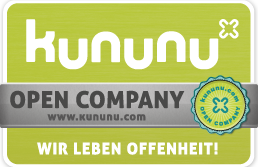Time savings of 20 per cent thanks to the use of Copilot
Editorial team: Hello Tobias, you are a much sought-after PROMOS employee. As a developer, you are responsible for our mobile solutions from easysquare. New requests come in all the time and your team has to pull out all the stops. Despite this, you found the time to talk to us today. Could this be due to the enormous reduction in workload that using Copilot has recently brought you in the development department?
Tobias Koops [laughs]: The answer to that is obvious. Of course, there is still more than enough work for us to do. What is true, however, is that we have become much more efficient in our programming.
Editorial team: You recently indicated to our Managing Director that you can achieve time savings of up to 20 per cent by using Copilot. That’s an incredible figure! Can you explain how this is possible?
Tobias: Of course! Copilot is a kind of coding aid. You can think of it like the automatically generated text suggestions when you type a message on your smartphone. This type of simple auto-complete suggestion of individual words has also been around for some time in programming. The groundbreaking thing about Copilot is that it suggests entire sections of code based on context, exactly matching what I’m looking for. So it’s not just a single word completed or a code structure specified.
Editorial team: Wow! That sounds impressive. Can you explain in more detail how you do this?
Tobias: To write a new section of code, I first start with a comment. This is used to describe what I want to do next in the code. Copilot not only completes the comment, but also suggests a complete section of code that matches my intention. Depending on the content, this is usually around six to eight lines of code. This means that the AI helps me in two respects: Assuming I already know what I want to write, Copilot saves me around 20 to 30 seconds of typing. But the time saved is even greater if I don’t even know how to write a particular section of code. That used to require a lot of online research for me. But with Copilot, it can be done accurately with just a few entries, simply from the context. That’s really amazing for us!

With just a few entries by the developer (white), Copilot generates multi-line programming code (green) according to the context and thus speeds up programming considerably.
Editorial team: I can really feel your enthusiasm. It sounds like you could also learn a lot in the process?
Tobias: Yes, of course. This helps enormously, especially with programming languages in which you are not yet very proficient. It’s like having a senior developer looking over your shoulder the whole time and telling you what to enter in the tricky places – almost priceless!
Editorial team: How would you compare the progress before and since you started using Copilot?
Tobias: It’s a quantum leap. I always compare it with the time before and after Google. Whereas in the past you had to know the exact address of a website and then laboriously check whether the page contained the information you needed, today you enter a few keywords and Google usually gives you an answer to your question in the first three hits. Copilot is similarly revolutionary for programming.
Editorial team: Copilot is an example of how PROMOS utilises artificial intelligence. Are there already concrete plans for how you want to make AI usable for our customers?
Tobias: Yes, definitely. We took the first steps in this direction around three years ago with the cooperation with our translation partner DeepL. I would also include the launch of our PROMi chatbot. Until now, however, such technologies were only part of a larger PROMOS solution. What we are currently planning is to examine application scenarios in which artificial intelligence can take over processes. We want to rethink our solutions. To this end, we are organising our first hackathon this month.
Editorial team: Can you explain what a hackathon is?
Tobias: A hackathon is about working together intensively and creatively on a specific problem within a limited period of time. Simply putting together some programming and seeing if it works. The use case we have chosen for the first hackathon is the processing of incoming mail at real estate companies.
Editorial team: Why did you choose this use case? What’s so exciting about this topic?
Tobias: It’s simply that incoming mail processing offers incredible savings potential. Imagine you leave your job as an administrative employee on Friday and a tenant enquiry arrives after work. Lots of spelling mistakes, several requests, some of them very urgent. What if the AI were to pre-structure this enquiry for you over the weekend, pre-formulate a reply email for you, perhaps even create a notification in SAP®, set up an appointment or even commission a trade company? AI is capable of processing and reacting to both complex and incomplete contexts. We would like to take advantage of this in the future!
Editorial team: I’m looking forward to your results! I have one last question. To what extent is Copilot accepted by your team?
Tobias: Initially, only a few of us were familiar with Copilot, but now 10 members of our team alone already have a licence, which is a little more than half. And the enthusiasm is spreading like wildfire. May I also now ask you a question?
Editorial team: Yes, of course!
Tobias: Are you using AI yet in the Communications Department?
Editorial team: Interesting point. In fact, we are increasingly focussing on how we can be supported by AI in our day-to-day activities. From invitation texts to inspiration for creative thought processes. The possibilities for use in search engine optimisation also sound promising.
Tobias: We’ll look forward to that. I bet you that in a few years’ time, when everyone’s using it, you won’t be able to imagine what it was like before!
Editorial team: That could well be the case. Thanks for your time Tobias!
Tobias: You’re welcome.
More on the topic of artificial intelligence:

